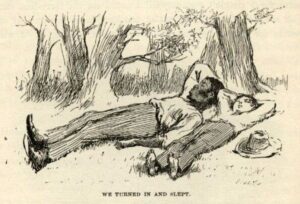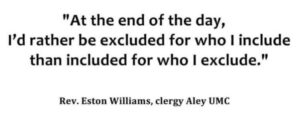The literary and moral turning point of Mark Twain’s iconic Huckleberry Finn makes me tear up every time.
Juvenile delinquent, Huck, and runaway slave, Jim, team up on a raft on the Mississippi River, sharing adventures, sharing life. Pretty soon, Huck realizes they have become friends – an epiphany that creates an existential crisis.

Huck’s conscience indicts him: it is wrong to steal someone else’s property. It is wrong to lie. It is wrong for a black man to go outside his proper place. And it is wrong for Huck to help him.
Clear, obvious and universal wrongs.
Right?
So the entire story turns on Huck’s decision – not only to sin against fundamental rules of his society, but also (as he had been taught) – to sin against foundational laws of God.
“All right then. I’ll go to hell.”
Growing up as a Southern Conservative Christian Woman, I know something about Huck’s world.
- The racial prejudices of our society were baptized as God’s will.
- The hierarchical, patriarchal order we created was presumed to be God’s universal and preordained plan for the world.
- Time bound, culture bound social attitudes and practices were sanctioned and sanctified by the God we created in our own image.
Much like Huck, my own existential crisis snuck up on me.
First came the questions; suspicions that my Hierarchical World was built on some very shaky foundations.
Then came movement; removing myself from the echo chambers of my youth and intentionally engaging in (often uncomfortable) conversations with multiple voices.
Then these multiple voices became friends. It was the friendships that created my own existential crisis.
“Anthropology trumps theology,” my husband says.
When new and different opinions came from the mouths of trusted companions, somehow I was able to listen differently; to hear whispers of truth about the Human and Divine that had been muted by all the clamorous “No’s” of my previous world.
I began to hear truth about the Human Condition and Divine Grace that had never been able to reach my heart before: all of us are fully included in God’s unconditional love.
Once I experienced full inclusion for myself, then I realized I dare not withhold full inclusion for any of God’s other children. This epiphany prompted a new formula for living:
I would rather face God’s judgment for including everyone than to be judged for excluding any one of God’s children.
If I am to be judged, then judge me for my grace.

- Grace for my queer as well as my homophobic family
- Grace for the Jims as well as the Huckleberry Finns.
- Grace for the lovers and grace for the haters.
Grace like Huck’s that will do whatever it takes to subvert the systemic powers that diminish, limit and exclude.
I hope Huck finally realized he was not going to hell because he loved Jim.

And I pray this discovery for my countless conservative sisters and brothers whose skewed theology keeps them trapped in their small, sad world of “No’s.”
I hope some day these otherwise good-hearted people will finally understand that hell is not some place we go; hell is what we create when we limit love and grace.
But that one thing I never got about the history of Christianity, was that in its evolution from the middle east, how did it get associated with white “authorities” — did those “racial” authorities vary as it spread east, for example, to make the “racial” ownership different depending on the history of the cultures adapting Christianity?
During its earliest years, Christianity was pretty much a subset of Judaism but within the first century, and yes, it did begin in Jerusalem so yes, a middle eastern flavor. But it quicly became a distinct religion separate from its parent faith and could be found all across the Mediterranean, from Aisa into Europe and down into Egypt. It’s appeal was a vision of a kind of classless society where rich and poor, slave and free, men and women could live together in mutual respect.
A huge shift happened in the 4th century when the Roman Emporer Constantine made Christianity the official religion of the state. Here is where the church was tempted to start prioritizing political power and social influence over love and humble service. This type of Christianity was significantly “Western” with all the Western baggage.
600 years later, the Great Schism divided “Western” Christianity from “Eastern” Christianity. The two movements grew in some significantly different ways.
I think American Christianity is its own unique creation, cradled in an infant nation that prioritized individual liberty over community. It is this individualism that has marked (and marred) authentic Christianity in our nation from our earliest beginnings. Our nation’s DNA of slavery and racism altered the original gospel vision of a classless community living together in harmony. We’ve never recovered from that. Although many of us keep trying.
Did I answer your question?
This is how I felt when I decided to divorce in 1975. I’m a PK as well and fully expected to be condemned by my family as well as my church. This was also during the time of much preaching in pulpits about women’s working outside the home (and other women’s lib topics) destroying the family. I agreed divorce was a sin but so was marrying someone just because there were few other options for women in the late 1960s. Be single? How would one support self?–teaching, nursing, secretarial but you had to be supported until degreed or had the job. Secretarial in San Francisco paid $400 a month (not $100 a week). I remain wholehearted for CHOICES!
Still my most favorite book of all… And still the only book I ever cried while reading. “It could make a body cry to think of how people treat one another…” (Huck Finn)
As a PK of 71 yrs I so understand the teachings and beliefs of a time gone by. In the understanding comes an anger at those who choose to not “see” the wrong of past beliefs. So many thoughts and feelings as I try to make room for those who refuse to go forward with an open and loving mind. Thank you many times over for your insights.
Margaret
Thank YOU for reading and for your important thoughts Margaret. From one PK to another, Peace, Charlotte
I’ll be there with you!!!
So well written and so true, Charlotte!
Lovely! You have described well the experience that many of us have had at some point, the lucky ones. Using one of my favorite characters to illustrate only made it better.
Thanks Sylvia!
Excellent. I couldn’t agree more.
Thanks Gary!